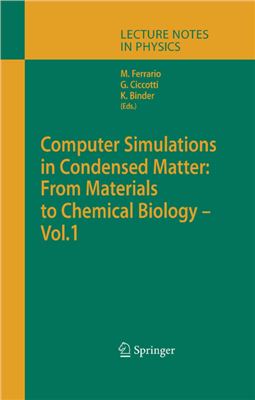Springer-Verlag Berlin, 2006, 711 pages
This extensive and comprehensive collection of lectures by world-leading experts in the field introduces and reviews all relevant computer simulation methods and their applications in condensed matter systems. Volume 1 is an in-depth introduction to a vast spectrum of computational techniques for statistical mechanical systems of condensed matter. It will enable the graduate student and both the specialist and nonspecialist researcher to get acquainted with the tools necessary to carry out numerical simulations at an advanced level.
Introduction: Condensed Matter Theory by Computer Simulation
Introduction to Cluster Monte Carlo Algorithms
Generic Sampling Strategies for Monte Carlo Simulation of Phase Behaviour
Simulation Techniques for Calculating Free Energies
Waste-Recycling Monte Carlo
Equilibrium Statistical Mechanics, Non-Hamiltonian Molecular Dynamics, and Novel Applications
from Resonance-Free Timesteps to Adiabatic Free Energy Dynamics
Simulating Charged Systems with ESPResSo
Density Functional Theory Based Ab Initio Molecular Dynamics Using the Car-Parrinello Approach
Large Scale Condensed Matter Calculations using the Gaussian and Augmented Plane Waves Method
Computing Free Energies and Accelerating Rare Events with Metadynamics
Transition Path Sampling Methods
Sampling Kinetic Protein Folding Pathways using All-Atom Models
Calculation of Classical Trajectories with Boundary Value Formulation
Transition Path Theory
Multiscale Modelling in Molecular Dynamics: Biomolecular Conformations as Metastable States
Transport Coefficients of Quantum-Classical Systems
Linearized Path Integral Methods for Quantum Time Correlation Functions
Ensemble Optimization Techniques for Classical and Quantum Systems
The Coupled Electron-Ion Monte Carlo Method
Path Resummations and the Fermion Sign Problem
This extensive and comprehensive collection of lectures by world-leading experts in the field introduces and reviews all relevant computer simulation methods and their applications in condensed matter systems. Volume 1 is an in-depth introduction to a vast spectrum of computational techniques for statistical mechanical systems of condensed matter. It will enable the graduate student and both the specialist and nonspecialist researcher to get acquainted with the tools necessary to carry out numerical simulations at an advanced level.
Introduction: Condensed Matter Theory by Computer Simulation
Introduction to Cluster Monte Carlo Algorithms
Generic Sampling Strategies for Monte Carlo Simulation of Phase Behaviour
Simulation Techniques for Calculating Free Energies
Waste-Recycling Monte Carlo
Equilibrium Statistical Mechanics, Non-Hamiltonian Molecular Dynamics, and Novel Applications
from Resonance-Free Timesteps to Adiabatic Free Energy Dynamics
Simulating Charged Systems with ESPResSo
Density Functional Theory Based Ab Initio Molecular Dynamics Using the Car-Parrinello Approach
Large Scale Condensed Matter Calculations using the Gaussian and Augmented Plane Waves Method
Computing Free Energies and Accelerating Rare Events with Metadynamics
Transition Path Sampling Methods
Sampling Kinetic Protein Folding Pathways using All-Atom Models
Calculation of Classical Trajectories with Boundary Value Formulation
Transition Path Theory
Multiscale Modelling in Molecular Dynamics: Biomolecular Conformations as Metastable States
Transport Coefficients of Quantum-Classical Systems
Linearized Path Integral Methods for Quantum Time Correlation Functions
Ensemble Optimization Techniques for Classical and Quantum Systems
The Coupled Electron-Ion Monte Carlo Method
Path Resummations and the Fermion Sign Problem

